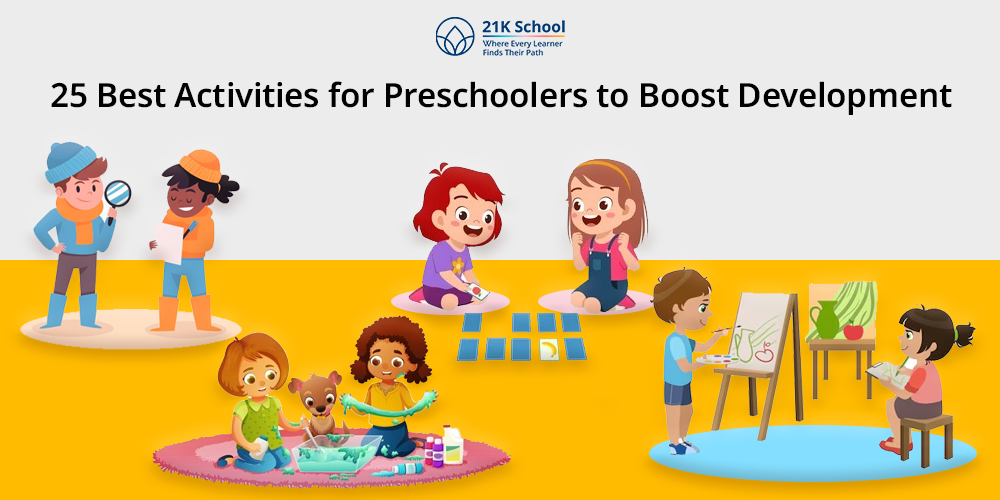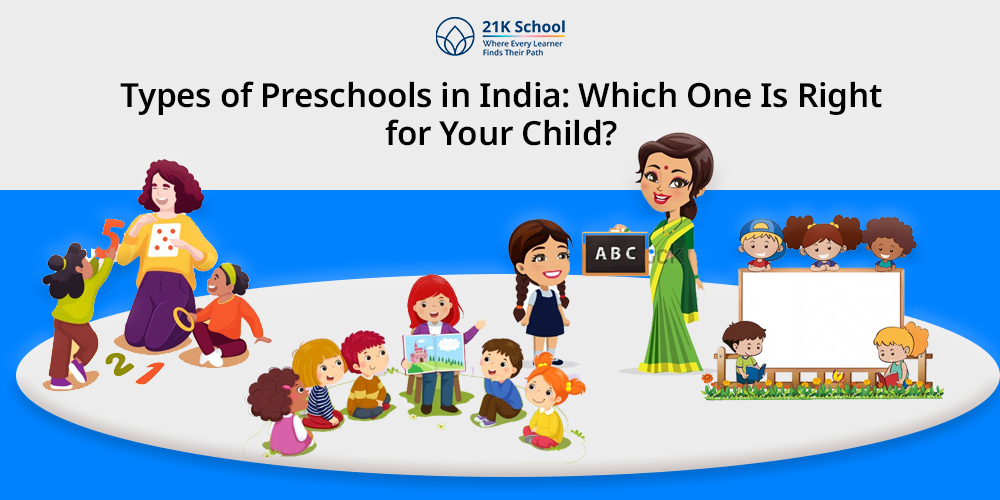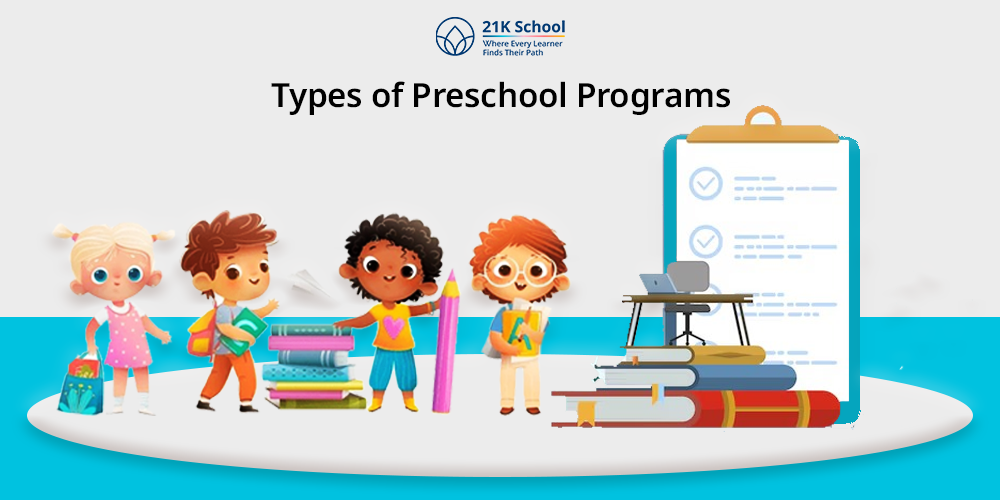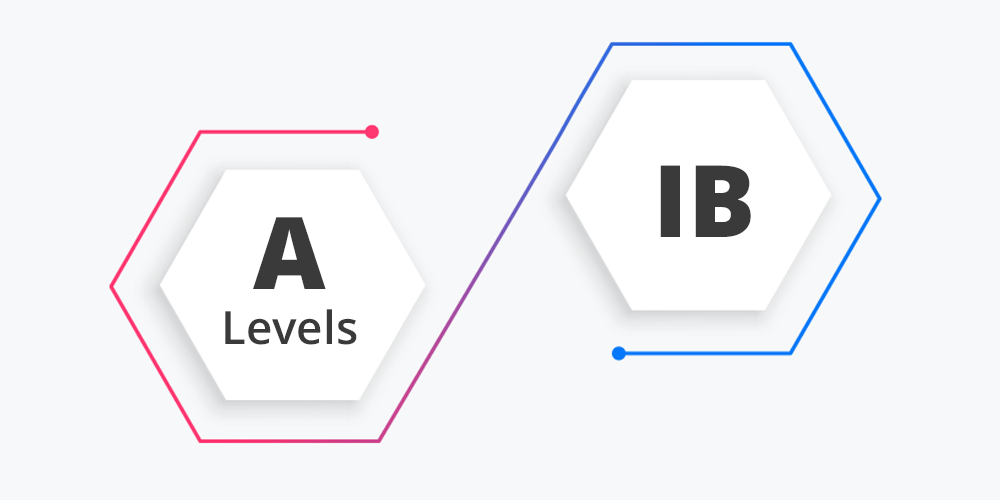
A-levels or the International Baccalaureate (IB) – do you know that this choice affects your further educational and professional endeavours?
Since the students are in the terminal year of their secondary education, they find themselves in a complex situation to deal with the challenges of selecting the right qualification.
A-levels and IB are two of the most popular pre-university qualifications in the world, characterised by differences in their curricula, approach to examinations, and university recognition.
But how should one then determine that one is better than the other for them?
In this blog, we shall examine both the A-levels and the IB Diploma, explore their key differences and similarities, and give you tips on which qualification may serve you better in University.
Table of Contents
- What are A-levels?
- What is the International Baccalaureate (IB)?
- 8 Factors to Consider: Making the Right Choice
- How are A-levels and IB Assessed?
- Differences Between A-levels Vs IB Diploma
- Similarities Between A-level and IB Diploma
- What are the Subject Differences between A-level and IB Diploma?
- What are the University Entry Requirements for IB vs A-level?
- How do IB Diploma Grades Work vs A-Levels?
- Which Qualification is More Highly Regarded by Universities?
- What are the Pros and Cons of A-level and IB?
- Conclusion
What are A-levels?
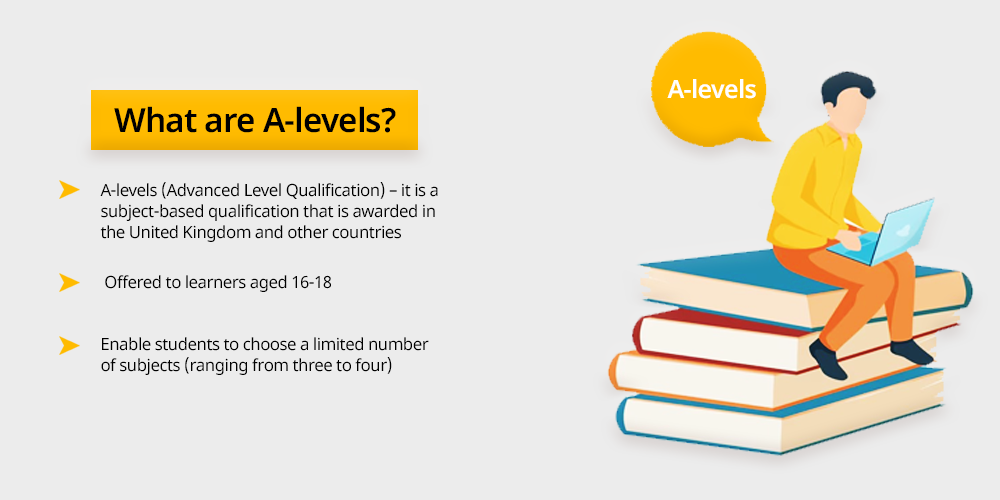
A-levels (Advanced Level Qualification) – it is a subject-based qualification that is awarded in the United Kingdom and other countries.
Traditionally offered to learners aged 16-18, A-levels enable students to choose a limited number of subjects (ranging from three to four)and study them for two years.
This qualification enables the learners to select subjects of their choice that align with their strengths in preparation for their career professions. Recall that A-levels offer academic rigour and subject specialisation among students.
If the student is very sure about the type of career he or she wants to pursue, then the common trend is to settle for A-levels.
For example, students who want to pursue careers in areas such as medicine, engineering, or law choose the relevant A-level subjects such as Biology, Physics, or History.
A-levels also have such benefits as flexibility of choice: as was said before, there are no restrictions regarding the choice of subjects for combination.
For precise information about A-level education, read- Understanding A-Levels: What They Are and How They Work
What is the International Baccalaureate (IB)?
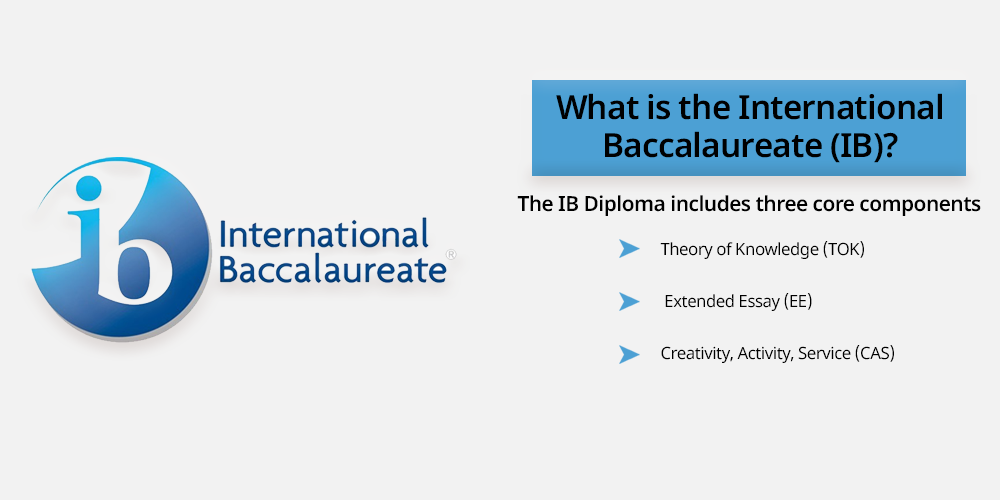
The International Baccalaureate (IB) Diploma Programme (DP) is a program of education for students aged between 16 and 19 years.
In contrast to A-levels, the IB has a learner taking six subjects distributed across the arts, humanities, social science, mathematics, natural sciences, and languages.
These subjects are spread across six groups: language and literature, second language acquisition, social relations of individuals, sciences, mathematics, and arts.
In addition to the subjects, the IB Diploma includes three core components:
- Theory of Knowledge (TOK): A critical thinking and reasoning course that explores how knowledge is acquired.
- Extended Essay (EE): A student can opt to write a 4,000-word research paper of their choice.
- Creativity, Activity, Service (CAS): One aspect that encourages students to come up with creativity and physical activity as well as participating in community service.
The purpose of the IB is the formation of well-rounded students possessing rich research, writing, and critical thinking experience.
It has earned its reputation mainly because of its comprehensive educational paradigm that includes academic and personality development.
8 Factors to Consider: Making the Right Choice
Here are 8 factors to consider when choosing between A-Levels and IB to help you make the right decision:
1. Subject Specialization vs. Breadth
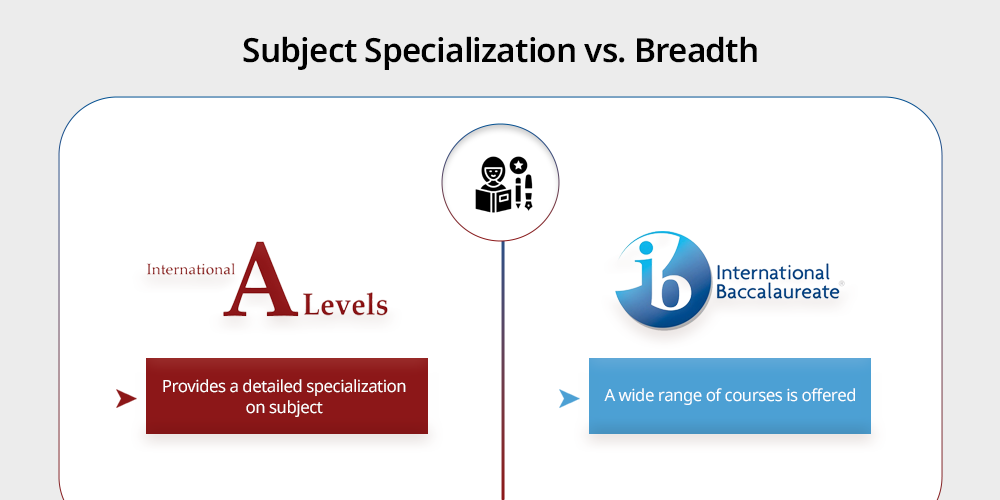
- A-Levels: Provides a detailed specialization on subject areas and allows students to focus intensely on areas they are passionate about.
- IB: A wide range of courses is offered, and students are required to take courses from six subject groups, thus ensuring well-rounded learning.
2. Assessment Style
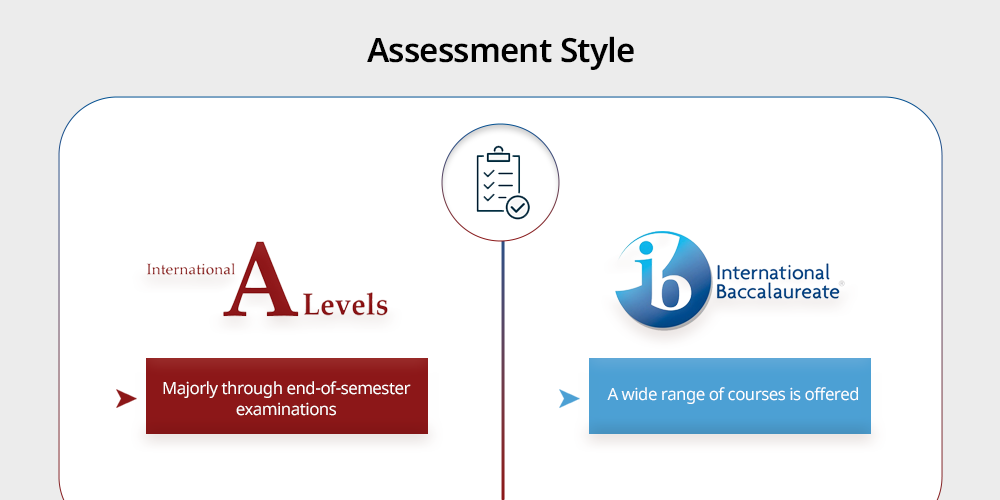
- A-Levels: Majorly through end-of-semester examinations conducted for the full accomplishment of the course.
- IB: This one ties the final exams together with the internal continuous assessments, thus offering a more varied evaluation approach.
3. Learning Style
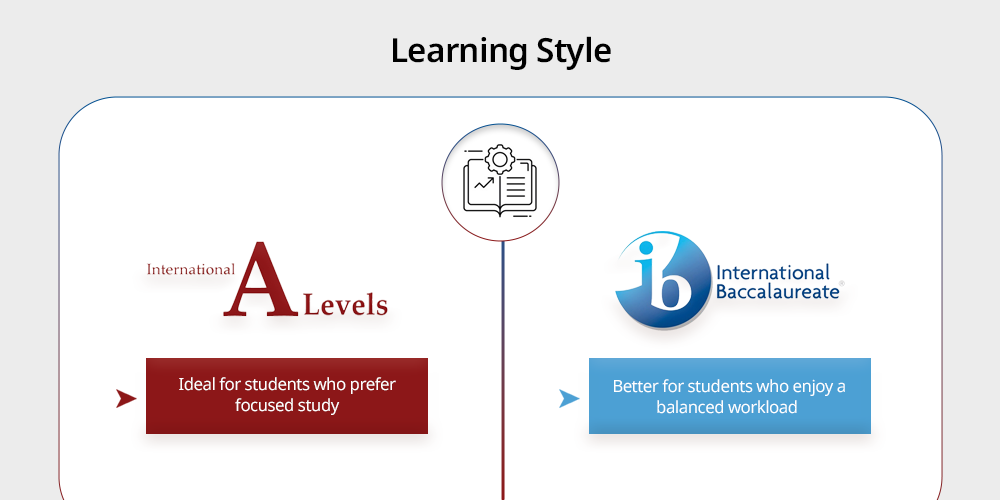
- A-Levels: Ideal for students who prefer focused study and deep mastery of fewer subjects.
- IB: Better for students who enjoy a balanced workload and can manage multiple subjects across disciplines.
4. University Requirements
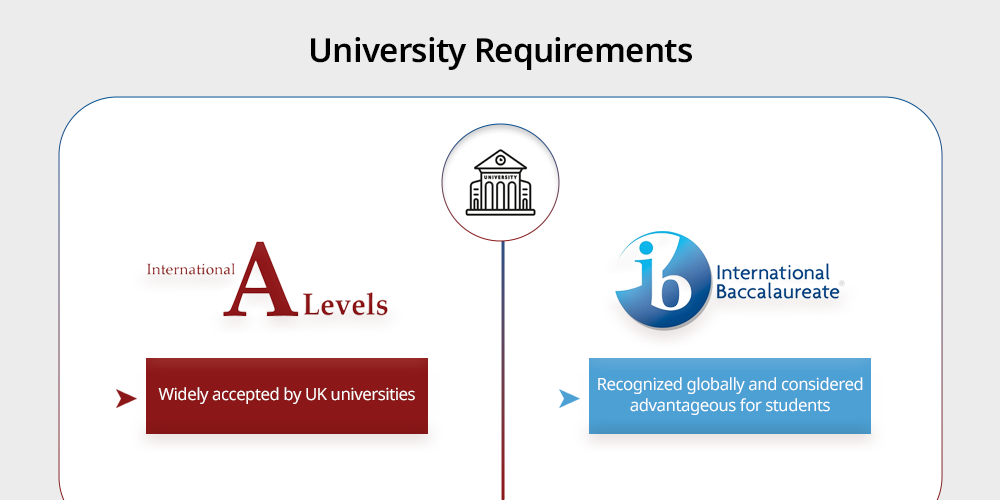
- A-Levels: Widely accepted by UK universities and other institutions worldwide, often preferred for UK-based higher education.
- IB: Recognized globally and considered advantageous for students aiming to apply to universities in different countries.
5. Core Components
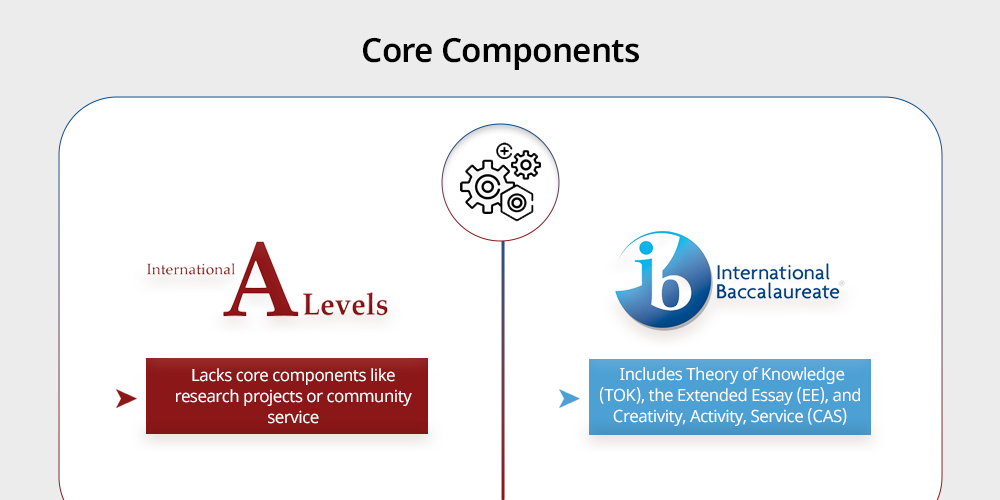
- A-Levels: Lacks core components like research projects or community service requirements.
- IB: Includes Theory of Knowledge (TOK), the Extended Essay (EE), and Creativity, Activity, Service (CAS), fostering critical thinking, research skills, and social responsibility.
6. Workload
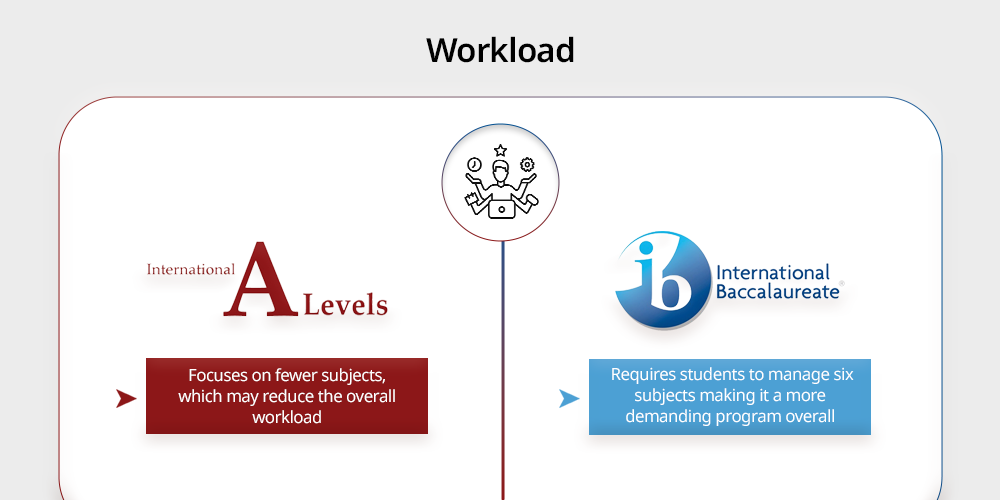
- A-Levels: Focuses on fewer subjects, which may reduce the overall workload but increases intensity in those specific areas.
- IB: Requires students to manage six subjects, including extended essays and extra activities, making it a more demanding program overall.
7. Career Goals
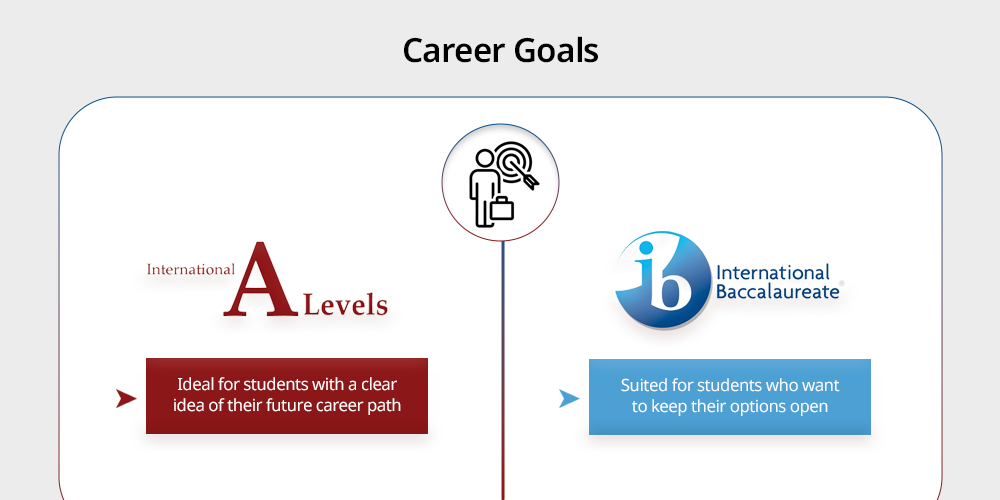
- A-Levels: Ideal for students with a clear idea of their future career path, as they can focus on relevant subjects.
- IB: Suited for students who want to keep their options open and develop a wide range of skills before specializing.
8. Global Perspective
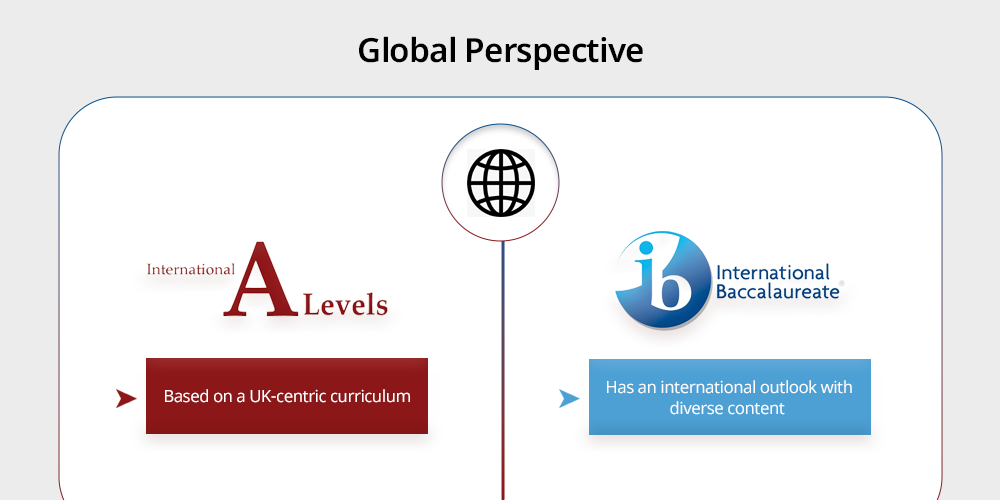
- A-Levels: Based on a UK-centric curriculum, though recognized globally.
- IB: Has an international outlook with diverse content, making it appealing for students seeking a global educational experience.
By weighing these factors, you can determine whether A-Levels or the IB better aligns with your academic strengths, learning style, and future aspirations.
How are A-levels and IB Assessed?
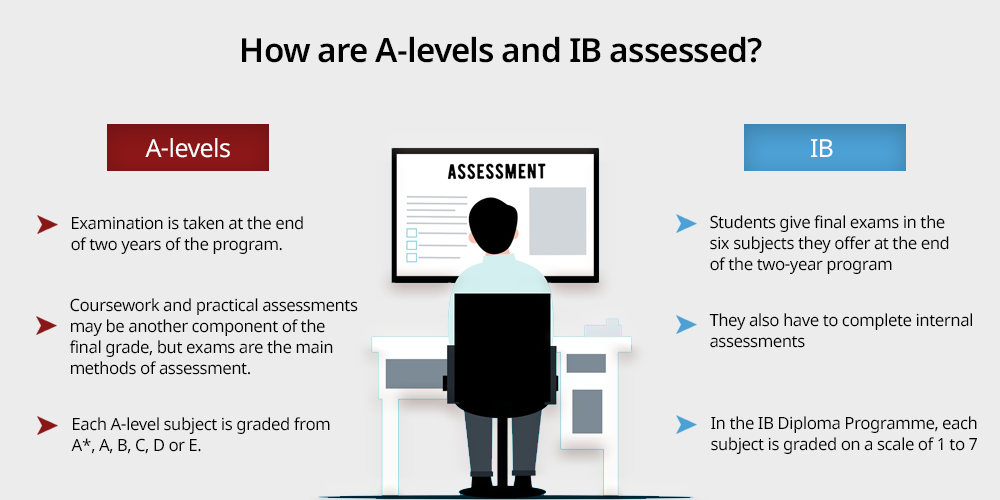
A-levels, where examination is taken at the end of two years of the program. These tests are usually paper-based and centre on the content of the topic taught in class throughout the course.
In some of the subjects, coursework and practical assessments may be another component of the final grade, but exams are the main methods of assessment.
Each A-level subject is graded from A*, A, B, C, D or E. When applying for a degree course, universities will usually offer a conditional place. This means the applicant’s place is dependent on achieving the A-level grades they require, for example AAB.
Read Understanding the A-Levels Grading System: A Guide for Students to know more about the grading system.
However, the performance in the IB Diploma is done through a combination of exams and internal assessments.
Students give final exams in the six subjects they offer at the end of the two-year program, but they also have to complete internal assessments that include essays, projects, oral presentations, and lab reports, depending on the subjects chosen by them.
In the IB Diploma Programme, each subject is graded on a scale of 1 to 7, with 7 being the highest score.
Students take six subjects in total, and their final score is the sum of these grades, giving a maximum possible score of 45 points.
These internal assessments contribute to the final grade, ensuring that students are evaluated on a variety of skills and not just their exam performance.
Differences Between A-levels Vs IB Diploma
Though A-levels and IB are both considered pre-university qualifications, the frameworks of these two programs are contrasting sharply in terms of their concepts.
| Aspect | A-Levels | International Baccalaureate (IB) |
| Subject Focus | – Focus on in-depth knowledge of specific subjects chosen by the student. – Offers flexibility in subject selection. | – Emphasises a broad, balanced curriculum with both quantitative and qualitative learning. – Focus on overall diverse development. |
| Curriculum | – Developed by the UK government and based on British content. | – Designed by an international organisation with global content and resources. |
| Assessment Style | – Evaluation primarily based on final exams. | – Combination of final exams and internal assessments. |
| Core Components | – Does not include additional core components like IB. | – Includes Theory of Knowledge (TOK), Extended Essay (EE), and Creativity, Activity, Service (CAS) to promote critical thinking, research, and community engagement. |
| International Recognition | – Accepted globally, especially by UK universities. | – Globally recognized and often considered more suitable for students planning to study abroad due to its international approach. |
- Subject Focus vs. Breadth: The most distinct difference between A-levels and
IB, for example, lies in the subject orientation. A-level students are very flexible since it’s required that students develop intensive knowledge of certain topics they are interested in. At the same time, IB overemphasised the students’ quantitative, qualitative, and overall topic while researching and improving students’ diverse development. - Assessment Style: As has been mentioned before, A-levels depend on the final tests as the main source of the students’ evaluation, while International Baccalaureate uses exams and internal assessments as the successful combination of evaluating the students.
- Core Components (IB): IB’s core components—TOK, EE, and CAS, distinguished itself from A-levels. These are meant to encourage critical thinking, independent research, and respect for the community while none of these are evaluated by the A-level.
- International Recognition: Both qualifications are accepted by universities all over the world today. However, according to its name, the IB is considered more suitable for those students who plan to enter a university in another country because the program is more diversified.
- Curriculum– A-levels are developed by the UK government and use predominantly British content. The IB is an international organisation that uses international resources and content.
Similarities Between A-level and IB Diploma
Both A-level and IB Diploma are higher education degrees that last for two years. Both degrees are internationally recognized programs which allow students to take admission to universities for higher education.
Both A-level and IB Diploma have different subject specialisations, curricula and workload. However, it has some similarities in terms of international recognition, duration, and assessments. The following are the mentioned similarities between A-level and IB Diploma.
1. Assessment Method
Both the assessment methods of A-levels and IB Diploma are based on examinations. The assessments were based on students’ understanding and their performance in the examination.
Both aspects use a grading system to assess students’ performance such as A-level provides A to E grading whereas IB diploma provides grading scale of 1 to 7.
2. Recognition
Both the A-level and IB Diploma are international programs which are recognised worldwide. Both credentials are accepted by universities around the world, providing access to higher learning.
Many universities accept both as acceptable prerequisites for admission and their academic validity is approved by most of universities.
3. Curriculum and Structure
The curriculum and structure of both A-level and IB Diploma are mostly the same. In both aspects, students have to select some subjects based on the specialisation. However, both courses have different subjects.
In A-level, students have to study 3 or four subjects, whereas in IB diploma, students have to study 5 to 6 subjects. But both give the autonomy of selection to students through which they can select any subjects.
4. Extended Projects
Both the A-level and IB diploma have some extended projects, which makes them similar in terms of assessments. In the IB diploma, students have to conduct independent research on a selected topic.
A-level students might also be able to finish projects or assignments by themselves, depending on the subject.
5. Enhance Students Participation
Both the A-level and IB Diploma encourage students to participate in extracurricular activities. The IB diploma focuses on Creativity, Activity and Services (CAS), and the A-level also focuses on external activities.
Both programs encourage students participation and make sure that every student learn new concepts through hands-on experience.
What are the Subject Differences between A-level and IB Diploma?
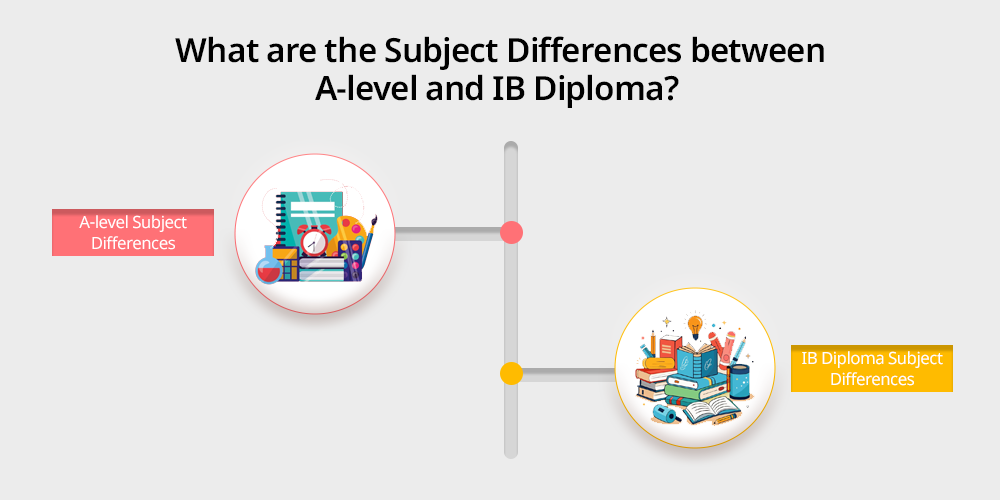
The subject differences between A-level and IB Diploma are vast in terms of subjects and flexibility, however, the grading system somehow follows the same level of aspects.
With A-Levels, students can focus on three to four subjects, allowing for in-depth research and a focus on specific areas of interest.
In order to receive the IB Diploma, students must complete six subjects including languages, math, science, humanities and optionally the arts.
The IB Diplomas‘ broader range of subjects encourages a more comprehensive approach to education, placing a strong emphasis on the creation of a well-rounded education.
| Aspect | A-level | IB Diploma |
| Subject Choice | In A-level, students can select 3 to 4 subjects out of multiple subjects. | In the IB Diploma, students have to select 6 subjects within 6 groups that contain language, math, science and humanities as compulsory subjects. |
| Subject Group | A-level has 3 to 4 subject groups, such as Group 1: ScienceGroup 2: LanguageGroup 3: HumanitiesGroup 4: Interdisciplinary Subjects | The IB Diploma has 6 groups, such as Group 1: Language 1Group 2: Language 2Group 3: ScienceGroup 4: Individual and Social SciencesGroup 5: MathematicsGroup 6: Art or Further Studies |
| Structure | A-level is a two-year course in which it focuses on the basics in the first year. | The IB Diploma is a two year course that focuses on Creativity, Activity, Service (CAS), the Extended Essay and Theory of Knowledge are the main pillars of this two-year program. |
| Subject Division | A level is divided into two phases, AS level and A2 level, in which students can drop a few subjects after the first year. | In the IB Diploma, children have to select 3 subjects, the same as A-level, after their first year. In which the three main chosen subjects will be carried forward to the next year |
A-level Subject Differences
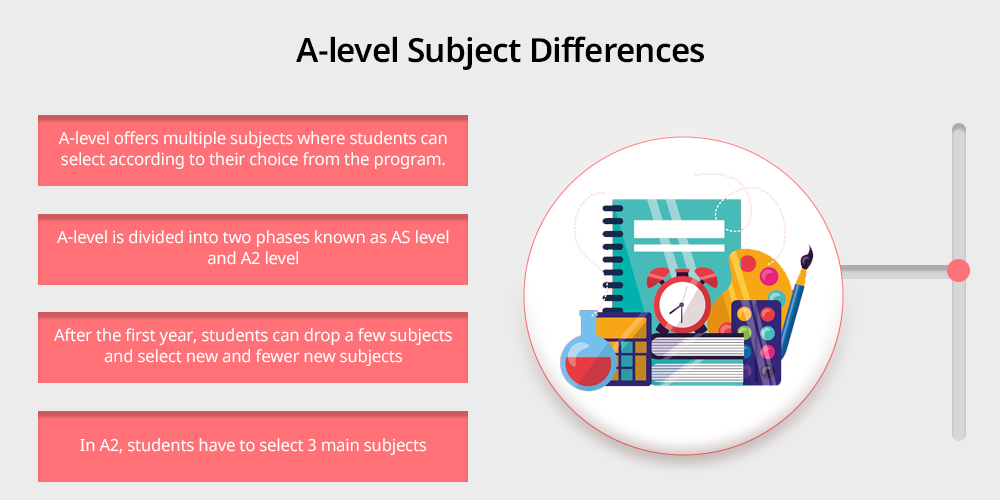
- A-level offers multiple subjects where students can select according to their choice from the program. A-level doesn’t have any limit where students can pursue any subject as per their interest.
- A-level is divided into two phases known as AS level and A2 level, where after the first year, students can drop a few subjects and select new and fewer new subjects. However, in A2, students have to select 3 main subjects, which will give them final grades for their exams.
IB Diploma Subject Differences
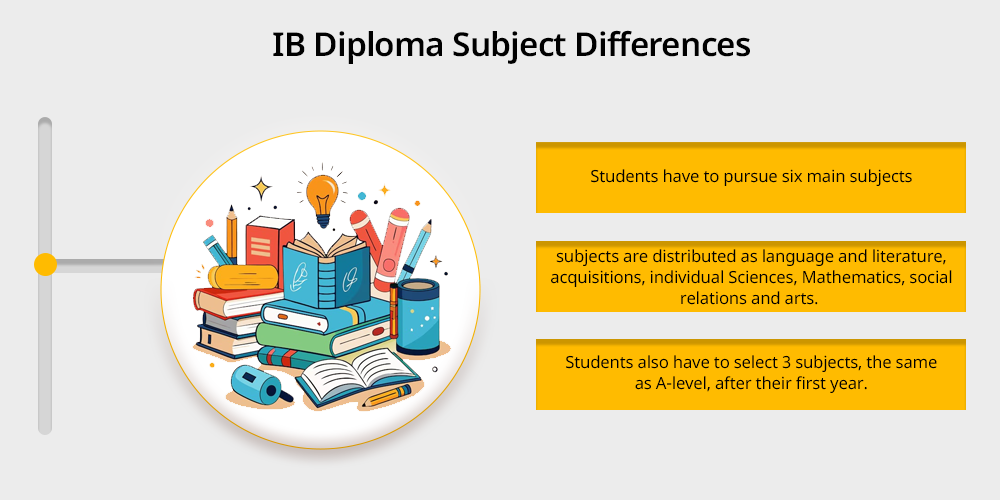
- The IB Diploma has different aspects of the selection of subjects, where students have to pursue six main subjects. These subjects are distributed as Arts, Humanities, Social Sciences, Natural Sciences, Language and Mathematics.
- Unlike A-level, it has six other groups in which subjects are distributed as language and literature, acquisitions, individual Sciences, Mathematics, social relations and arts.
- In IB Diploma, students also have to select 3 subjects, the same as A-level, after their first year. In which the three main chosen subjects will be carried forward to the next year for the second year too.
What are the University Entry Requirements for IB vs A-level?
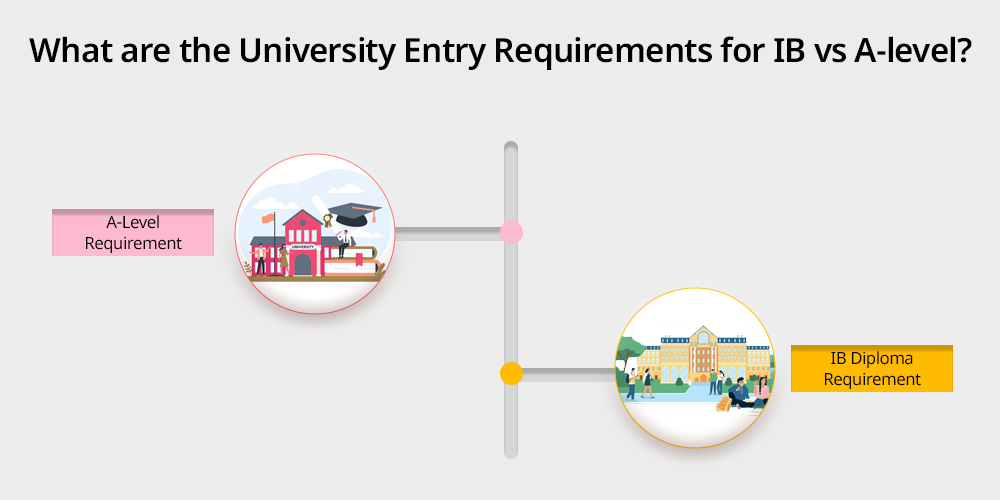
The university entry requirements of IB and A-level have different aspects. Both the A-level and IB are accepted internationally and require specific criteria for admission. Here you can check the requirements of both A-level and IB Diploma.
A-Level Requirement
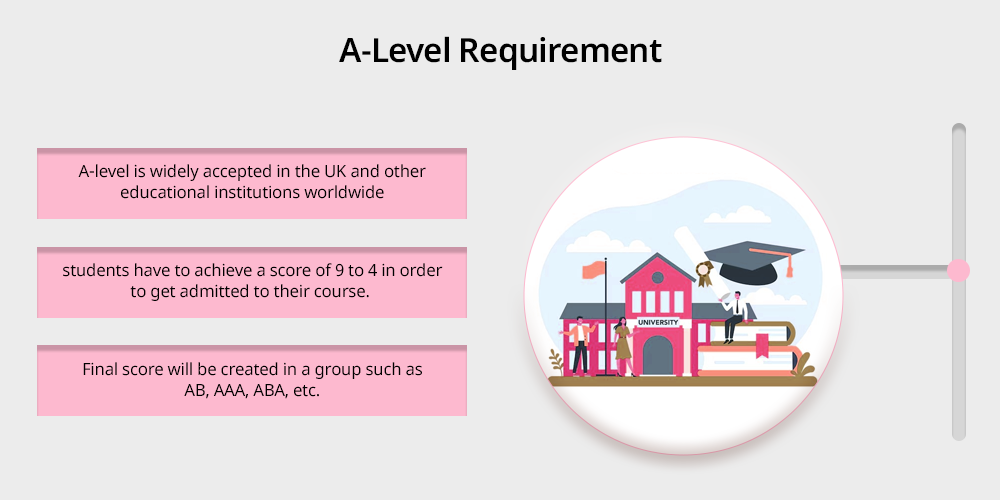
- A-level is widely accepted in the UK and other educational institutions worldwide. To enrol in A-level courses, students have to complete GCSE exams. To pass the GCSE exams, students have to achieve a score of 9 to 4 in order to get admitted to their course.
- Unlike the IB Diploma, students have to choose a limited subjects in A-level courses, such as 3 to 4 subjects and have to study for two years. Basically the A-level scores are converted into UCAS through which the final score will be created in a group such as AB, AAA, ABA, etc.
IB Diploma Requirement
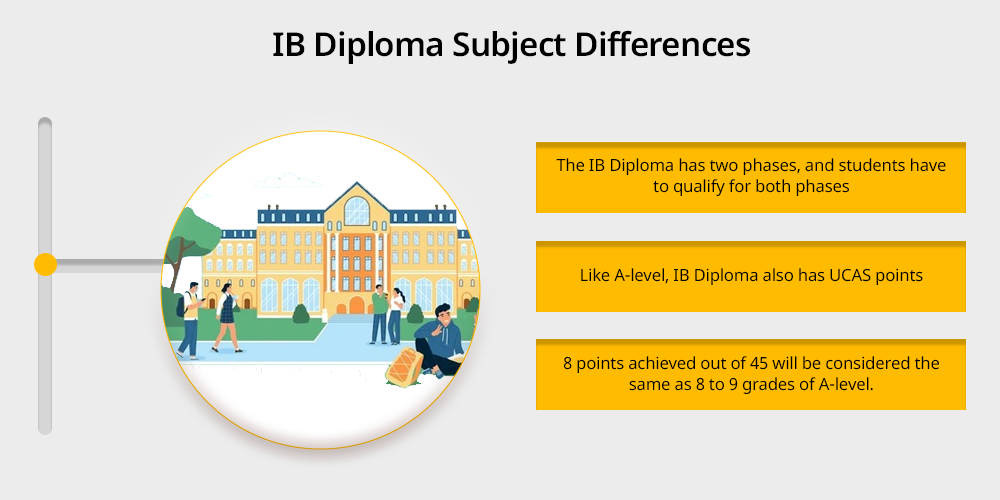
- The IB Diploma has two phases, higher level and standard level, which consist of 6 subjects. Each phase has 3 subjects, and students have to qualify for both phases, and candidates have to score at least 24 points in order to get admitted.
- Like A-level, IB Diploma also has UCAS points, which convert the scores achieved by students in the form of points and grades. For example, 38 points achieved out of 45 will be considered the same as 8 to 9 grades of A-level.
- However, other factors were also taken into consideration by combining internal assessments such as project works, oral tests, lab projects, presentations, etc.
How do IB Diploma Grades Work vs A-Levels?
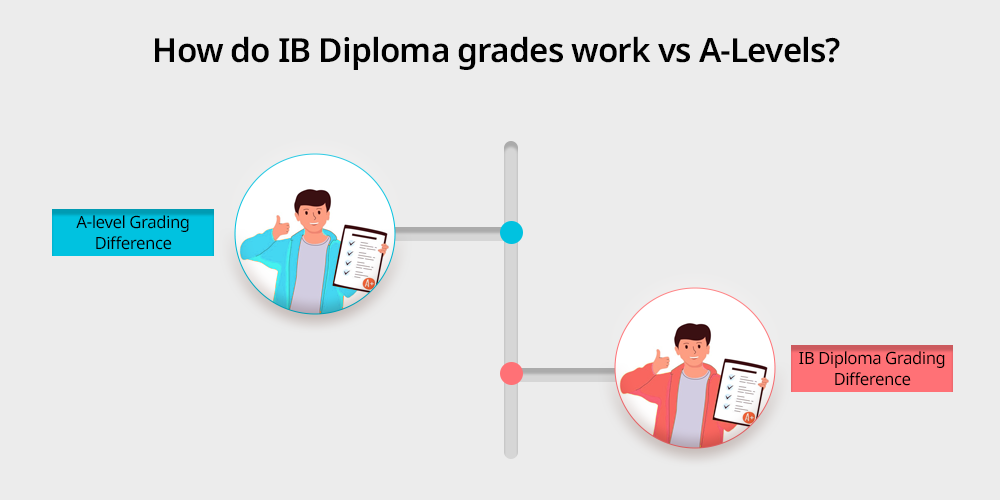
The subject differences between A-level and IB Diploma have different aspects. Both have a grading system that uses the UCAS grade conversion method and compiles GCSE grade boundaries.
A-level Grading Difference
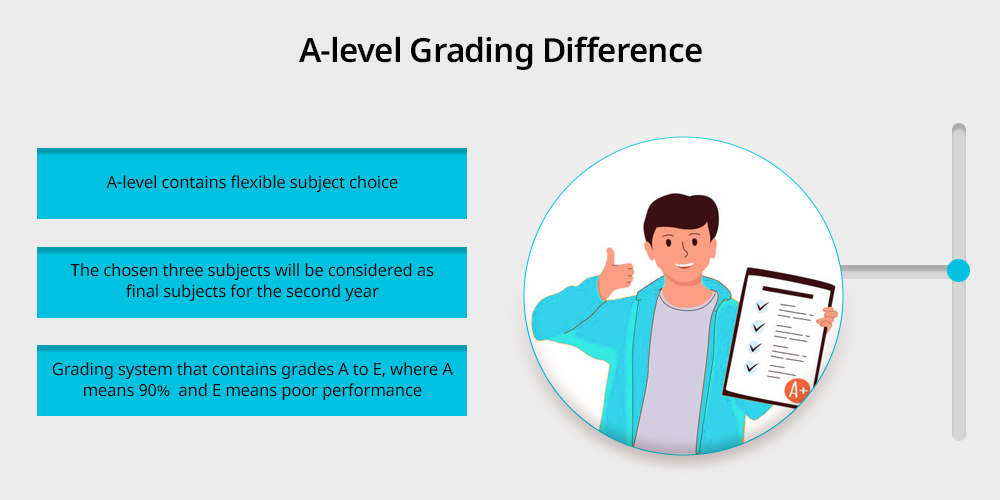
- A-level contains flexible subject choice and provides 55 subjects through which students can choose 3 to 4 subjects as per their interests. A-level education is acceptable in more than 125 countries and provides flexible opportunities.
- The chosen three subjects will be considered as final subjects for the second year, as well. The assessment of A-level is basically done through a grading system that contains grades A to E, where A means 90% and E means poor performance.
IB Diploma Grading Difference
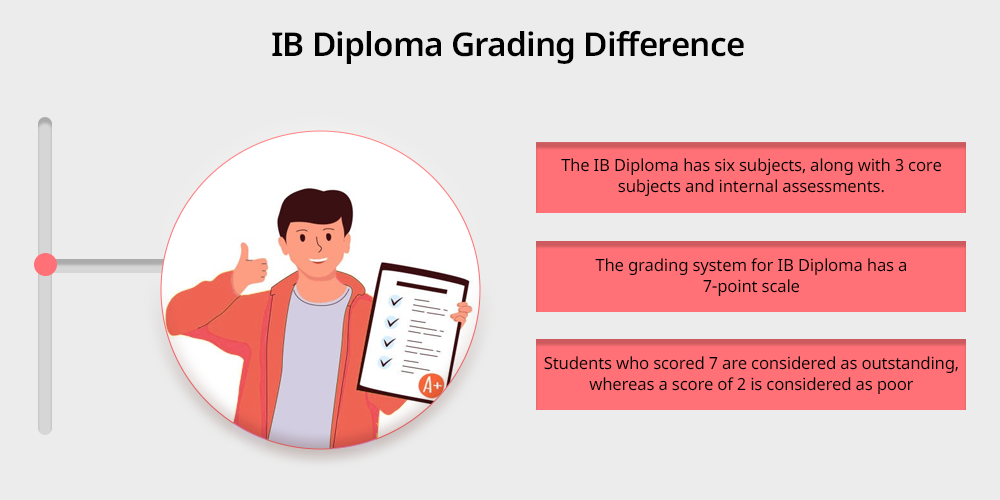
- The IB Diploma has six subjects, along with 3 core subjects and internal assessments. In IB Diploma, students have to study all the subjects in the program for two years.
- The subjects for IB Diploma are Arts, Humanities, Social Sciences, Natural Sciences, Language and Mathematics, along with core subjects such as Theory of Knowledge, Extended Essay, and Creativity, Activity and Service.
- The grading system for IB Diploma has a 7-point scale in which students who scored 7 are considered as outstanding, whereas a score of 2 is considered as poor performance.
Like A-level, IB Diploma also uses the UCAS grade conversion method. In which students have 42 points for 6 subjects and 3 points for core subjects.
Which Qualification is More Highly Regarded by Universities?
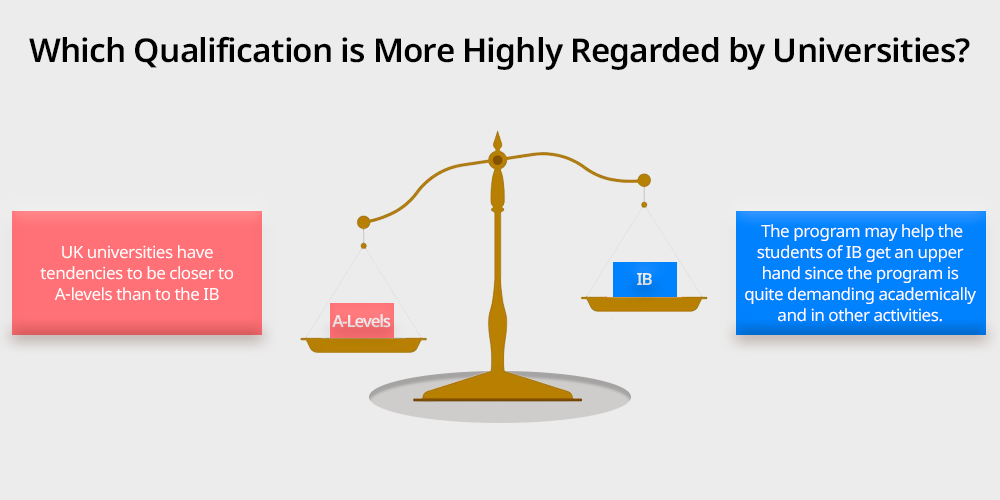
A-level and IB are recognized in universities all over the world; nevertheless, some universities may have certain inclinations towards certain types of qualifications or countries.
For instance, UK universities have tendencies to be closer to A-levels than to the IB since the latter is more famous in Europe, the United States, and Canada because of its internationality and balanced curriculum.
In some cases, the program may help the students of IB get an upper hand since the program is quite demanding academically and in other activities.
Furthermore, the valuable practical research skills acquired in the course of the Extended Essay and the critical thinking encouraged in the Theory of Knowledge.
Read Choosing The Right Curriculum For Your Child to get more details about both IB and A-level curriculum
It creates particular values that can make the holder of an IB diploma attractive to employers, especially in those areas of the economy where sophisticated analysis and writing skills are required.
Still, A-level students are equally eligible to compete for the specialised degree programs when they confirm their mastery of the chosen subjects.
What are the Pros and Cons of A-level and IB?
A-Levels
Pros:
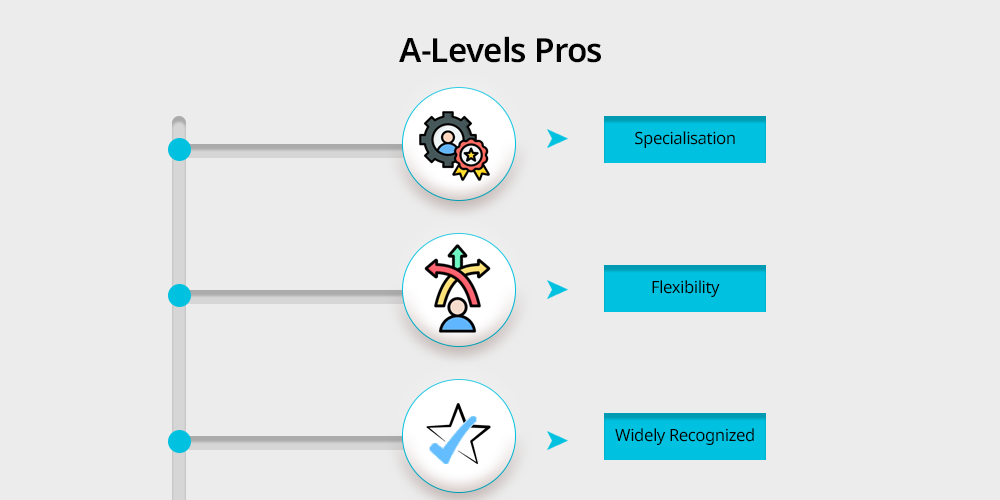
- Specialisation: This enables students to focus deeply on their areas of interest which may be useful for those who are passionate about a particular subject, they know exactly what they want as far as their field of study is concerned.
- Flexibility: Students get to select the subjects of strength to create a convenient framework that leads to a customised pathway toward the preferred university or certain careers.
- Widely Recognized: In particular, A-levels are highly valued practically in all universities, especially in the United Kingdom, facilitating enrollment to bachelor’s degree courses of such universities, especially if one wants to take a specialised course.
Cons:
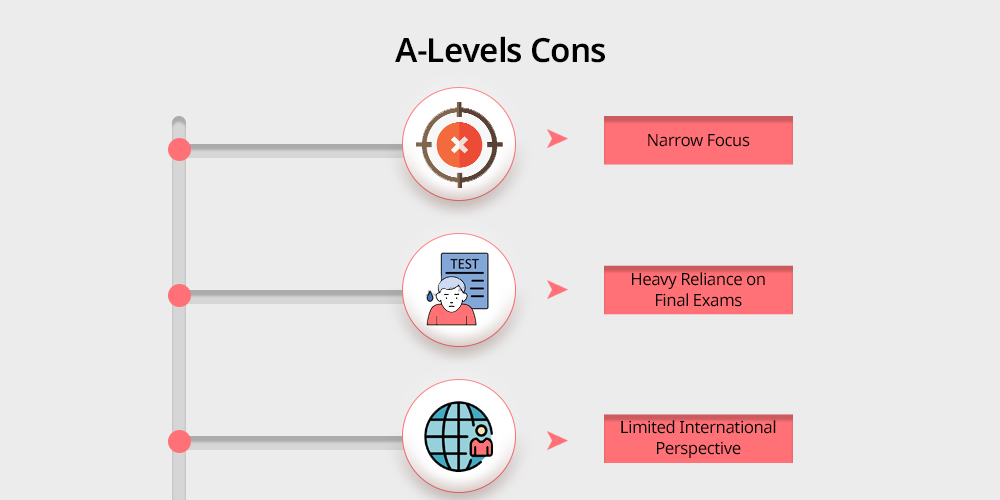
- Narrow Focus: Since students choose a small number of subjects, they may miss out on wider knowledge of different subjects and that can be a disadvantage for a more balanced education.
- Heavy Reliance on Final Exams: A-level grades are largely determined by final exams, which can add immense pressure on students and may not fully reflect their abilities or progress throughout the course.
- Limited International Perspective: It is mostly linked to the British syllabi as does International Baccalaureate, where students get acquainted with concepts from all over the world.
International Baccalaureate (IB)
Pros:
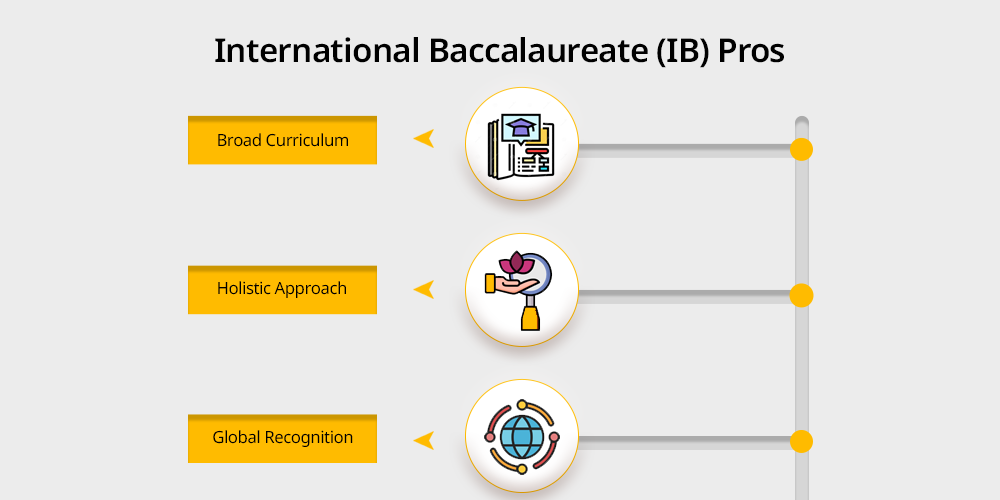
- Broad Curriculum:
IB promotes a well-balanced education in needs all students to have several courses they cover with an added focus on the general and physical well-being of the learners. - Holistic Approach: TOK, EE, and CAS – are the main parts of the program, which form critical thinking skills, and research abilities, and nurture students for a future that is not limited to academic achievements.
- Global Recognition: This type of education is recognized by universities around the world, especially for those planning to study in another country, as it acquaints a child with academic conditions for learning on the international level.
Cons:
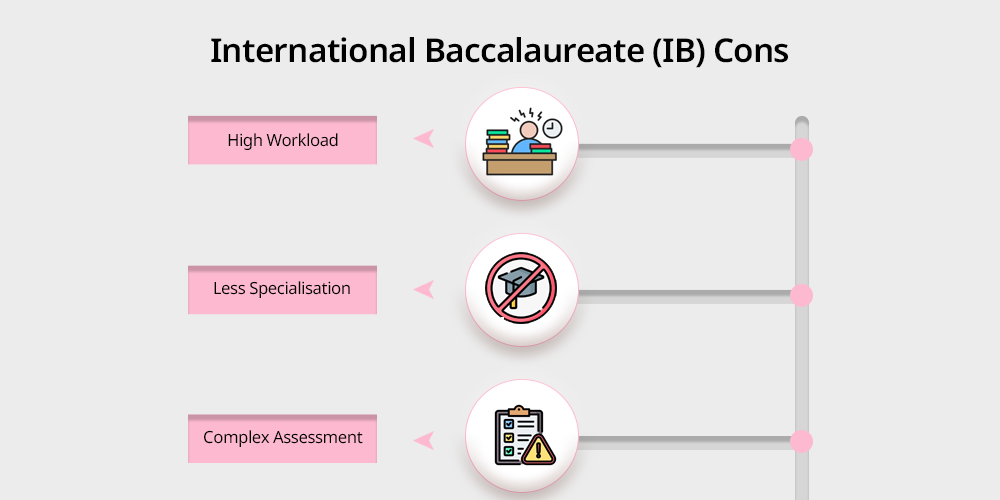
- High Workload: IB students are faced with many subjects as well as core part elements which may at times cause stress as well as management of time.
- Less Specialisation: The vast range of subjects may be a disadvantage to students with a choice of majoring in certain areas or those who already have clear ideas of what they wish to do in the future.
- Complex Assessment: With multiple internal assessments, exams, and coursework, the IB assessment process can be overwhelming and require strong organisational skills.
Conclusion
It is important not to treat the options between A-levels and the IB as an easy choice as both have different routes towards the way students succeed academically and in their professions.
A-levels offer a deeper understanding of the subjects as the learning focuses on a few areas of study, in which the learners may have definite career interests.
At the same time, the IB is a coherent encompassing curriculum that develops critical thinking, an international outlook, and multiple skills.
Therefore, the final decision should be reached based on academic performance, interest, and the intended future job specialisation.
Further, there are platforms like 21K school that caters to both the students who either choose IB and A-levels curriculum.
Regardless of the choice, A-levels and IB are equally good preparation for further education and prepare students for the world within the Global world.

